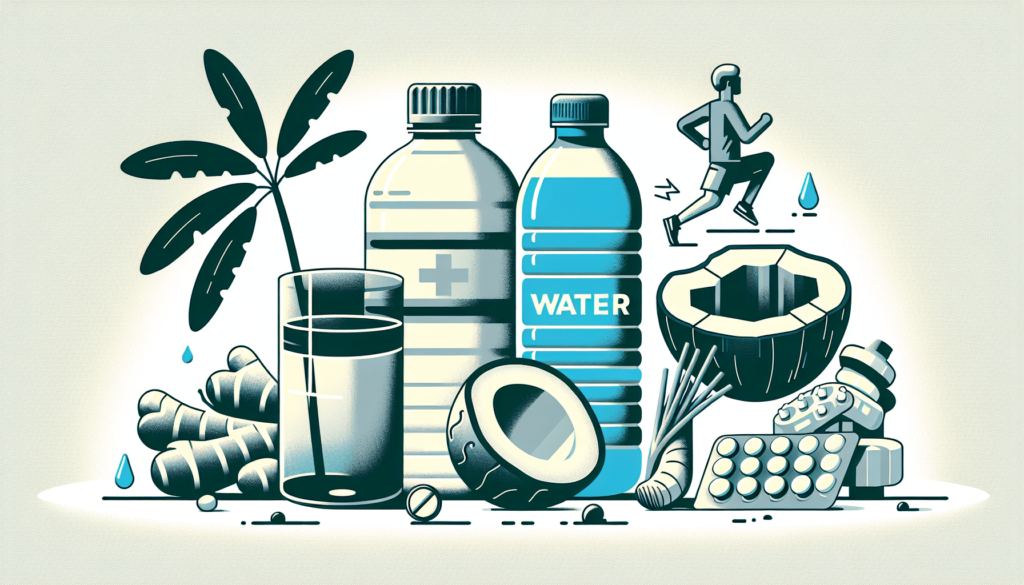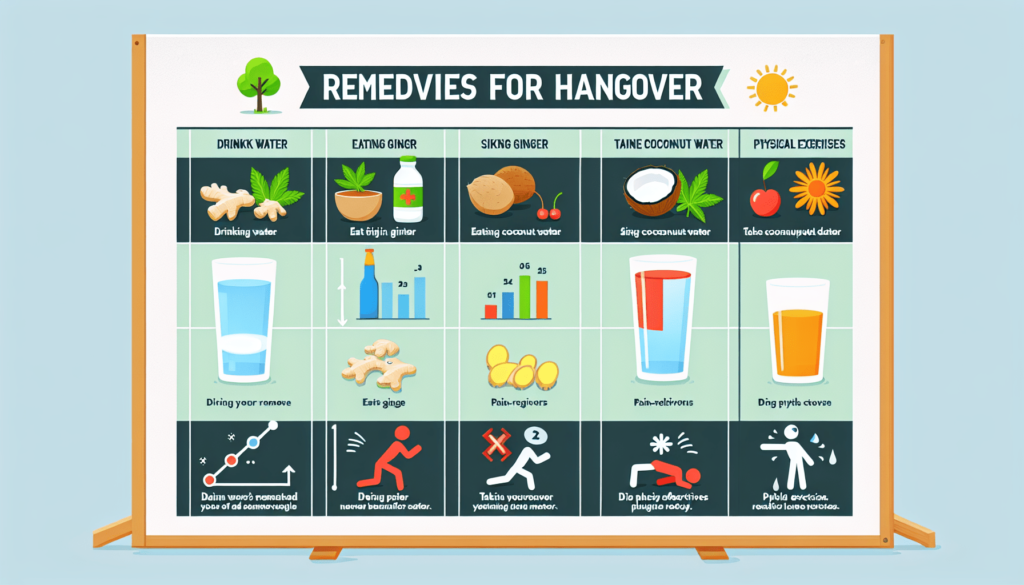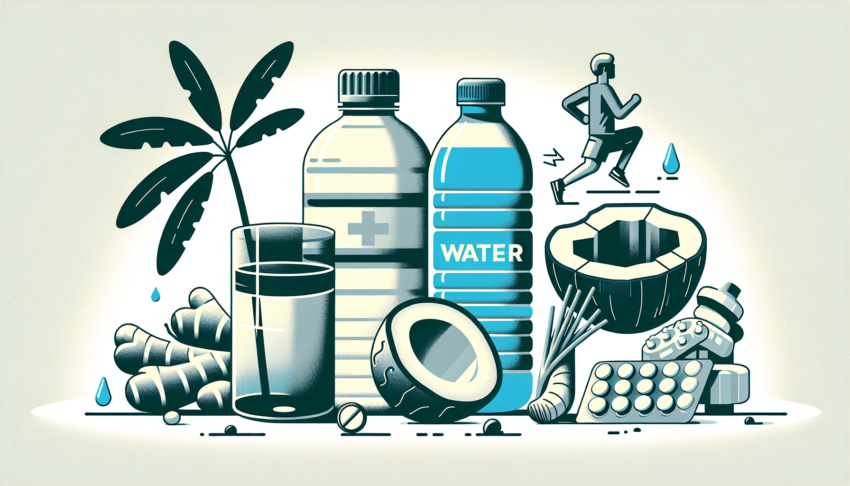Feeling groggy, nauseous, and regretful after a night of indulgence is a familiar sensation for many. When the pounding headache and queasy stomach kick in, you might find yourself desperately searching for the most effective remedy to alleviate hangover symptoms. Look no further, as we uncover the ultimate solution that will have you back on your feet in no time.
1. Hydration
Drink water
One of the most important remedies for hangover symptoms is staying hydrated. Alcohol is a diuretic, which means it increases urine production and can lead to dehydration. To combat this, it is crucial to drink plenty of water throughout the day and especially after a night of drinking. Aim to drink at least eight glasses of water or more, spaced out evenly throughout the day. This will help replenish your body’s water levels and alleviate some of the common symptoms associated with hangovers.
Consume electrolyte-rich beverages
In addition to water, it is beneficial to consume electrolyte-rich beverages to rehydrate your body. Electrolytes are minerals that help regulate fluid balance and muscle function. Sports drinks, such as Gatorade or Pedialyte, contain electrolytes like sodium and potassium. These can help replenish what your body may have lost due to alcohol consumption. Just be mindful of the sugar content in some of these beverages and opt for sugar-free options if possible.
Opt for coconut water
Another excellent way to replenish electrolytes and stay hydrated is by drinking coconut water. Coconut water is a natural source of electrolytes, including potassium and magnesium. It is also a refreshing and tasty option that can help quench your thirst. Consider keeping some coconut water on hand for those mornings when you wake up feeling the effects of a hangover.
Avoid caffeinated beverages
While it may be tempting to reach for a cup of coffee or an energy drink to combat fatigue associated with hangovers, it’s best to avoid caffeine. Caffeine is a stimulant that can worsen dehydration and potentially increase feelings of agitation or jitters. Stick to hydrating beverages such as water, electrolyte-rich drinks, and coconut water to better support your body’s recovery.
2. Nutritional Remedies
Eat a balanced breakfast
Starting your day with a balanced breakfast can help replenish the nutrients your body may be lacking after a night of drinking. Include a variety of foods that are rich in vitamins and minerals, such as fruits, vegetables, whole grains, and lean proteins. A healthy breakfast can provide much-needed energy and help stabilize your blood sugar levels.
Include foods rich in vitamins and minerals
Certain foods are particularly beneficial for hangover recovery due to their high vitamin and mineral content. Foods rich in vitamin C, like citrus fruits and berries, can help support your immune system and reduce inflammation. Bananas are a great source of potassium, which can help balance electrolyte levels. Leafy greens, such as spinach or kale, are packed with vitamins and minerals that can support your overall well-being.
Try ginger or peppermint
Ginger and peppermint are natural remedies that have been used for centuries to alleviate nausea and digestive discomfort. Ginger can be consumed in various forms, such as ginger tea or ginger candies. Peppermint, on the other hand, can be enjoyed as a tea or through the use of peppermint essential oil. Both options can help soothe an upset stomach and may provide relief from hangover-related symptoms.
Consider supplements like B vitamins and magnesium
Supplements can also be beneficial in supporting your body’s recovery from a hangover. B vitamins, especially vitamin B-6 and B-12, are important for energy metabolism and can help replenish nutrients lost during alcohol consumption. Magnesium is another supplement to consider, as it plays a role in relaxing muscles and may help alleviate headaches or muscle tension often associated with hangovers. Before starting any new supplements, it’s advisable to consult with a healthcare professional to ensure they are appropriate for your individual needs.

3. Rest and Sleep
Allow yourself to rest
One of the simplest yet effective remedies for a hangover is to allow yourself to rest. Alcohol can disrupt your sleep patterns, leading to feelings of fatigue and grogginess the following day. Take it easy and prioritize giving your body the rest it needs to recover fully. Listen to your body and know when it’s time for a break.
Take a nap if needed
If you’re feeling particularly exhausted, taking a short nap can help refresh your body and mind. Keep it to around 20-30 minutes to avoid interfering with your nighttime sleep. Napping can provide a quick energy boost and help alleviate some of the overall discomfort associated with hangovers.
Get a good night’s sleep after a night out
Although it may be challenging to fall asleep after a night of drinking, making an effort to get a good night’s sleep is essential for your body’s recovery. Try establishing a relaxing bedtime routine, such as taking a warm bath, practicing deep breathing or meditation, and ensuring your sleep environment is cool, dark, and quiet. This will help improve the quality of your sleep and aid in relieving hangover symptoms.
4. Pain Relief
Take NSAIDs if suitable
If you’re experiencing headache or body aches, nonsteroidal anti-inflammatory drugs (NSAIDs) like ibuprofen or aspirin can provide relief. NSAIDs can help reduce pain and inflammation associated with hangover symptoms. However, it’s important to check with your healthcare provider or pharmacist to ensure these medications are safe to take based on your individual health history and any medications you may already be taking.
Avoid acetaminophen if you’ve consumed alcohol
While NSAIDs can be helpful, it’s crucial to avoid acetaminophen (such as Tylenol) if you’ve consumed alcohol. Both alcohol and acetaminophen can stress your liver, and combining them can increase the risk of liver damage. Stick to NSAIDs or natural remedies to alleviate pain and discomfort.
Consider natural remedies like white willow bark or turmeric
For those who prefer a more natural approach to pain relief, there are a few options to consider. White willow bark has been used for centuries as a natural pain reliever and is believed to have similar effects to aspirin. Turmeric, with its active compound called curcumin, has anti-inflammatory properties that can potentially reduce headache or body pain. These natural remedies may be worth exploring, but as always, it’s advisable to consult with a healthcare professional before starting any new treatments.

5. Replenish Electrolytes
Consume sports drinks or electrolyte supplements
To replenish electrolytes lost during the consumption of alcohol, consider reaching for sports drinks or electrolyte supplements. These beverages are formulated to provide a balance of electrolytes, including sodium and potassium. They can be particularly beneficial if you’ve experienced excessive sweating or vomiting due to alcohol consumption. Opt for sugar-free options if available to avoid any unnecessary added sugars.
Eat foods rich in potassium and sodium
In addition to electrolyte-rich beverages, you can replenish electrolytes by incorporating foods rich in potassium and sodium into your diet. Bananas, avocados, potatoes, and leafy greens are excellent sources of potassium. Sodium can be found in foods like pickles, broth, and salty snacks. Including these foods in your meals or snacks can help restore electrolyte balance and support your body’s recovery.
Try coconut water
Coconut water, mentioned earlier as a hydration option, is also an excellent source of electrolytes. It contains natural sugars, sodium, and potassium, making it a ideal choice for replenishing electrolytes after a hangover. It’s a refreshing and tasty alternative to sugary sports drinks, and it can be enjoyed on its own or mixed with other ingredients to create a delicious smoothie.
6. Ginger or Peppermint
Consume ginger or peppermint tea
Ginger and peppermint, which were mentioned earlier as natural remedies for nausea, can also be consumed as teas. These herbal teas can have a soothing effect on your stomach and digestive system, helping to minimize queasiness or discomfort. Sip on a cup of ginger or peppermint tea to settle your stomach and provide some relief from hangover symptoms.
Chew on ginger or peppermint candies
If you prefer a more portable option, ginger or peppermint candies can also be effective in easing nausea. Keep a stash of these candies on hand, especially if you frequently experience stomach upset after consuming alcohol. They provide a convenient and tasty way to provide quick relief while on the go.
Try ginger or peppermint essential oil
For those who prefer aromatherapy, ginger or peppermint essential oils can be used to alleviate nausea. Add a few drops of either oil to a diffuser or a cotton ball and inhale the scent. The aroma can help calm your stomach and reduce feelings of nausea. Be sure to use high-quality essential oils and follow the instructions for use carefully.

7. Natural Remedies
Try milk thistle or prickly pear extract
Milk thistle and prickly pear extract are natural remedies that have been studied for their potential to reduce hangover symptoms. Milk thistle contains silymarin, a compound that has been shown to have antioxidant and anti-inflammatory properties, which may help protect the liver from alcohol-induced damage. Prickly pear extract, derived from a cactus, has been suggested to reduce hangover symptoms such as nausea and dry mouth. While more research is needed to solidify their effectiveness, these natural remedies may be worth considering.
Consider artichoke extract
Artichoke extract is another natural remedy that is thought to support liver health. It contains compounds that can promote the production of bile, which aids in digestion and detoxification processes. While research on artichoke extract specifically for hangover symptoms is limited, its potential benefits for liver health make it a plausible option to explore.
Explore herbal remedies like chamomile or dandelion
Chamomile and dandelion are two herbal remedies that have been traditionally used for their soothing and detoxifying properties. Chamomile tea can help relax the body and mind, promoting a sense of calm and aiding in better sleep. Dandelion tea or supplements are believed to support liver function and may assist in the detoxification process. Incorporating these herbal remedies into your routine may enhance your overall hangover recovery.
8. Sweat It Out
Engage in light exercise
Engaging in light exercise can help boost your mood and alleviate some of the uncomfortable symptoms associated with a hangover. Gentle activities such as walking, cycling, or light jogging can stimulate blood flow, release endorphins, and promote overall well-being. Choose activities that you enjoy and feel comfortable doing without overexerting yourself.
Go for a walk or gentle jog
If you’re up to it, going for a walk or a gentle jog can be a great way to get some fresh air and increase your heart rate. Physical activity stimulates the release of endorphins, which are natural mood-boosting chemicals in the brain. This can help improve your overall mindset and provide a distraction from any lingering hangover symptoms.
Try yoga or stretching
Yoga or stretching exercises can be particularly beneficial for hangover recovery. These activities can help stretch and relax your muscles, alleviate tension, and promote a sense of calm and focus. Various poses and stretches can target specific areas of discomfort or help to improve overall flexibility. Take it slow and listen to your body to avoid any strain or overexertion.

9. Time and Patience
Hangovers typically resolve with time
Perhaps the most important remedy for hangovers is time. Hangovers are a result of your body processing and eliminating alcohol from your system. Given enough time, your body will naturally recover and return to its normal state. While hangovers can be uncomfortable, reminding yourself that they are temporary can help shift your perspective and provide some solace.
Be patient and allow your body to recover
Being patient with your body and giving it the time it needs to recover is crucial for effective hangover relief. Avoid pushing yourself too hard or expecting immediate relief from all symptoms. Understand that your body is working to restore its balance and that the uncomfortable symptoms will gradually fade away. Trust in the healing process and take the necessary steps to support your body’s recovery.
Avoid excessive alcohol consumption in the future
Perhaps the most effective remedy for hangover symptoms is prevention. The best way to avoid experiencing the discomfort of a hangover is to drink responsibly and in moderation. Be mindful of your alcohol intake, pace yourself, and consider alternating alcoholic drinks with water or other non-alcoholic beverages. Knowing your limits and making responsible choices can minimize the chances of a hangover and its associated symptoms.
10. Personalized Approaches
Experiment with different remedies to find what works for you
It’s important to remember that everyone’s body is unique, and what works for one person may not work for another. When it comes to finding the most effective hangover remedy for yourself, it may require some trial and error. Experiment with different remedies, whether it’s hydration, nutrition, natural remedies, or lifestyle changes, to determine what provides you with the greatest relief and recovery.
Take note of your body’s unique response to certain remedies
As you are experimenting with different remedies, pay attention to how your body responds to each one. Keep a journal or note on your phone to record which remedies alleviate specific symptoms or make you feel better overall. This will help you identify patterns and develop a personalized hangover relief plan for future occasions.
Consult a healthcare professional for personalized advice
If you’re unsure about which remedies or treatments are most suitable for your individual situation, it’s always wise to consult with a healthcare professional. They can provide personalized advice based on your medical history, current medications, and any underlying health conditions. A healthcare professional can also guide you in choosing the most appropriate supplements, lifestyle changes, or natural remedies to aid in hangover recovery. Don’t hesitate to seek professional assistance when needed.



